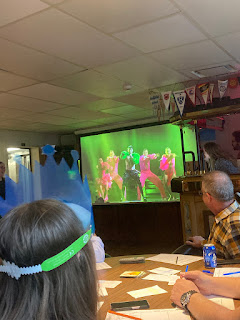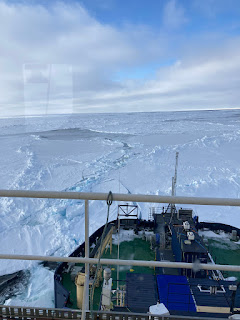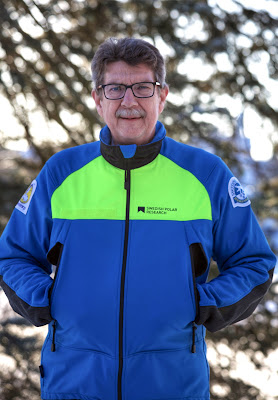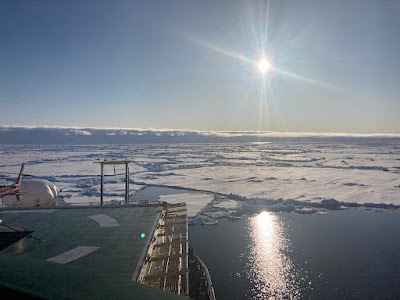Eurovision on the top of the world and time for the first ice camp
One week has passed but it feels like weeks as so much has already happened: leaving from Svalbard on Monday eve, reaching the sea ice edge the next day, got caught up by a storm on Saturday, drifted by the ice floe south during the attempt of going north, trying to find a way through the thick ice to get further north, preparation work for ice camp, instrument maintenance, helicopter ice stations, captain invited dinner, Eurovision...
You might wonder how we could have Eurovision on Oden with no internet connection. Well, it is possible! We were quite many participating in Oden Eurovision - the bar on Oden was packed from scientists and crew members. One scientist on board had downloaded the videos from almost all the 26 finalists and these videos were then shown to us in the correct order as they were performed for in the rest of the world. We were given voting sheets where we could individually judge the costumes, performance, lyrics, melody and other characteristics of each finalist. This resulted in total points for each one and eventually the top 15 performances were ranked (best one getting 15 points). During our Eurovision, we also had two hosts that introduced every finalist and sometimes told us a short story about the artist. Some countries, such as Finland, got quite a cheerful reactions once Käärijä started to sing. Some of us gave Finland more points because of the pallets they had in their performed show (as we here, on Oden, transport and lift stuff stapled on pallets with cranes :D).
After seeing all the finalist and given our final individual ranking points, one person of each country represented on Oden collected all voting sheets of her/his country and counted the total points. The procedure for finding out the winner was conducted similarly as in the the rest of the world - the country representative came up on the stage and revealed the points, e.g., "And 15 points goo tooo....". The winner of Eurovision Song Contest at the top of the world (on Oden) was Finland, second place Norway and on the third place came France. Sweden was ranked on 5th place. This was a superfun evening (even though our final results did not match the rest of the world, but still quite close!). The ranking and winner of the "real Eurovision" were revealed on Sunday morning - Sweden as the winner but Norway and Finland were all in the top 5 ! :O)
Sunday 14 May & Monday 15 May - attempt to go north
The storm passed away during the night and Sunday morning was sunny with northerly winds bringing colder and dryer air towards Oden. The winds were still quite strong but dropped during the day. Weaker winds allowed the helicopter to go out for screening the ice and trying to find a possible way for us to move north. However, during the Eurovision night, we had to move a bit out from the stationary position to prevent Oden to be squeezed in-between the ice and a thicker ice floe.
It was quite difficult to find a way north; we were mostly drifted southward with the ice, ocean currents and the northerly winds. Occasionally we stopped and then tried again. The thicker ice with ridges is pushing from the north makes it difficult for us to get any northerly than 80N. We also drifted a bit westwards into Greenlands waters.
Some scientists were allowed to go out on the ice with the helicopter to take ice cores, slnowsampes and water samples. But for most of us these two days were for preparing and resting for the coming ice camp on Tuesday May 16. We tried on floating suites (yellow-blue suites; Theresa on the photo) and marked the ones that fits us with our name. Winter boots were brought to the storage room so that everything would be ready for us to go on the ice.
The ice floe (1km in diameter) was spotted and selected on Monday evening - the ice camp is going to happen on Tuesday! Oden will be moored onto the ice floe in the morning and a group of scientists are then going onto the ice to scout the ice and to find a spot where to build our met-station (weather station onto the ice with instruments measuring radiation, surface temperature, moisture, winds, turbulent fluxes...) and where other sites on the floe can be built. The weather is sunny, a bit cold (-14 degrees) but with weak winds. The plan is to stay at this ice camp for the next 5-6 days, hoping for the predicted atmospheric river to hit us in the end of the week. As it is still far into the forecast, it is still uncertain if we will get one atmospheric river and if yes, where and when it will exactly come. Will be excited to go on the ice and build up our first ice camp of this expedition!







Comments
Post a Comment